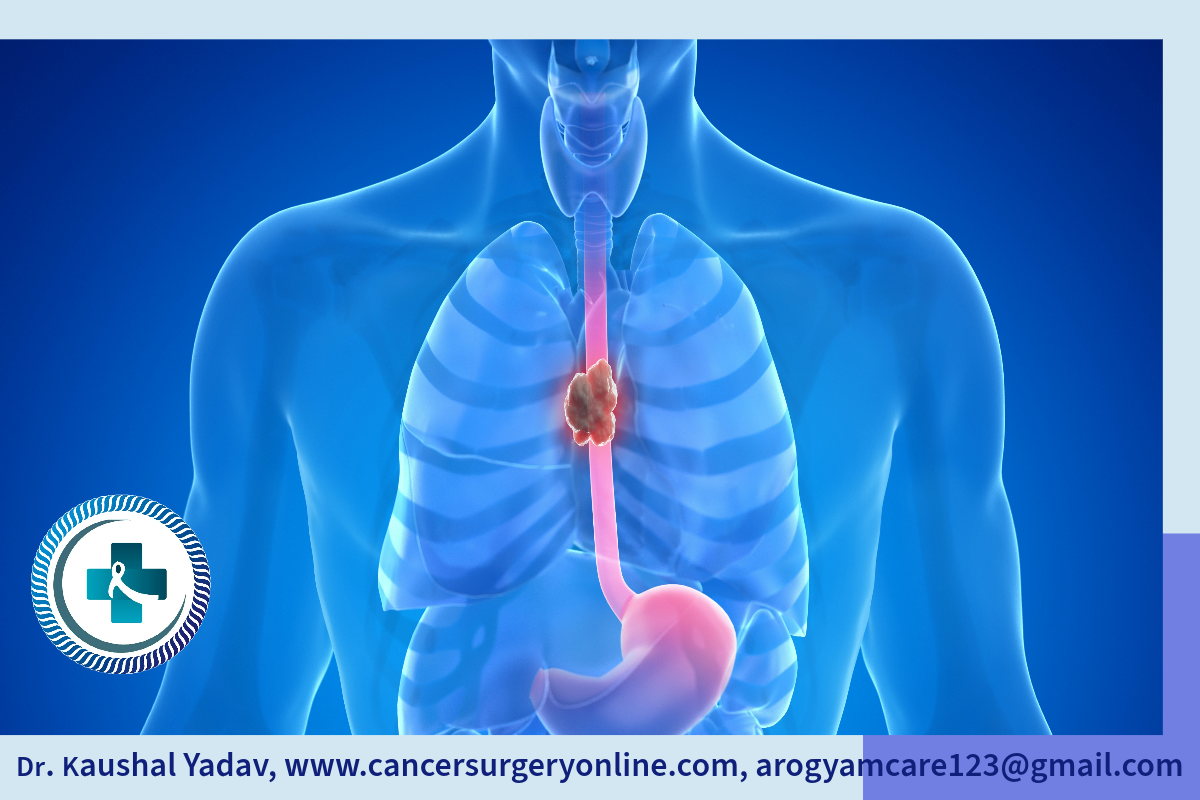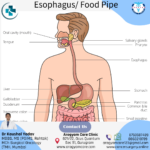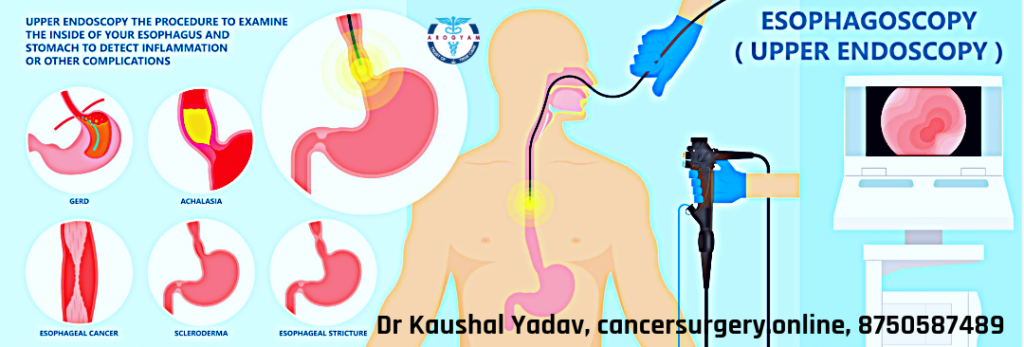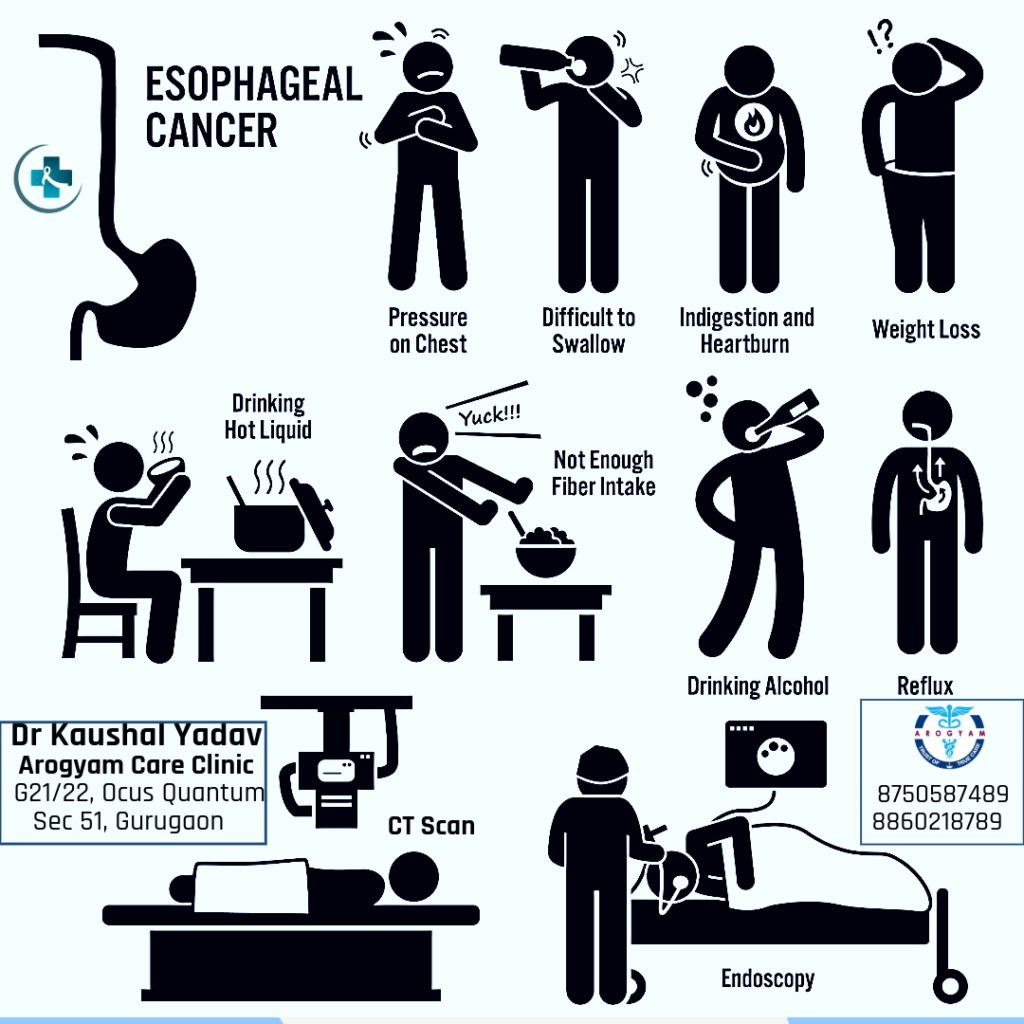Esophagus Cancer

What is food pipe cancer?
 Esophagus, also called as food pipe is a hollow muscular tube that connect throat to the stomach. It is around 20-25 cm long and 2-3 cm wide. Foods goes from mouth to stomach in abdomen through esophagus/ food pipe. When cells in esophagus lining begin to grow out of control, they form esophagus cancer
Esophagus, also called as food pipe is a hollow muscular tube that connect throat to the stomach. It is around 20-25 cm long and 2-3 cm wide. Foods goes from mouth to stomach in abdomen through esophagus/ food pipe. When cells in esophagus lining begin to grow out of control, they form esophagus cancer
- 8th most common cancer and 6th most common cause of cancer related deaths worldwide.
- In India, esophagus cancer is 3rd most common cancer in males. Overall, it is 5th most common cancer and also 5th most common cause of cancer related mortality.
- There is regional variation in incidence of esophagus cancer in India.
- More common in males compared to females
- Esophagus cancer is among highly aggressive cancers, although cure rate is improving compared to previous.
Types
- Squamous Cell Carcinoma – more common in upper and middle third part of esophagus.
- Adenocarcinoma- more common in lower third part of esophagus
Risk Factors/ Causes of esophagus cancer
- Age >50 years
- Tobacco
- Alcohol
- Gastroesophageal Reflux disease
- Dietary Factors: red meat, very hot liquids, dietary deficiency of selenium/ zinc/ folate
- Prior corrosive injury
- Radiation exposure
- Underlying esophageal diseases: achalasia, Barret’s esophagus, Tylosis. Esophageal achalasia cardia require treatment with laparoscopic Heller’s cardiomyotomy with gastric fundoplication. Barret’s esophagus should be kept under regular endoscopic surveillance and treatment as require.
- Prior history of head and neck cancer
- Obesity
- Genetic causes- very small no of cases
- Diet rich in fruits and vegetables containing antioxidants, mineral and vitamins, dietary cereal fibers and regular physical activity are considered as protective factors.
Screening for Esophagus Cancer:
There is no standard or routine screening test for esophageal cancer. However, people with Barrett’s esophagus may be advised to have regular endoscopic examinations. An endoscopic examination is a procedure that uses a flexible, lighted tube to look inside the esophagus.
Alarmimg Signs of Esophagus Cancer
Esophagus is among few of very aggressive cancers. It is usually diagnosed in late stages and has high mortality rate. There are no routine guidelines for screening esophageal cancer. People who have a high risk for esophageal cancer like Barret’s esophagus, genetic predisposition or precancerous conditions should be followed closely. Disease diagnosed in early stage has better cure rates. Although symptoms appear in advance stage, following symptoms should be looked with high index of suspicion and doctor should be consulted regarding endoscopy or other investigation requirements.
- Dysphagia: progressive difficulty in swallowing ca ne because of esophageal cancer. Dysphagia of esophagus cancer starts with solid food and gradually increased even for liquids foods as cancer grows. There are many causes of dysphagia like esophageal spasm, benign esophageal stricture, achlasia cardia. These all reasons have specific history and characters like in achalasia cardia dysphagia is more for liquid food while in case of esophagus cancer dysphagia starts with solid food. New onset dysphagia should always be evaluated properly.
- Pain or burning feeling in chest
- Weight Loss
- Vomiting
- Blood loss presenting either as blood staining in vomiting or anaemia
- Cough or hoarseness of voice
- Fistula with airways : Tracheoesophageal or brochoesophageal fistula leading to pulmonary complications
Investigations
- Upper GI Endoscopy and Endoscopic Ultrasound with Biopsy – most common procedure for initial evaluation and confirmation of diagnosis.
- CECT/ PET CECT- for pretreatment disease extent evaluation both at primary site and distant site.
- Bronchoscopy – in case of suspected airway involvement.
- Diagnostic laparoscopy/ thoracoscopy

Treatment of esophagus cancer
Best doctors for carcinoma esophagus suggest surgery as most effective treatment.
Surgery – Esophagectomy: Most of the esophagus along with a small upper part of stomach and regional lymph nodes are excised. Remaining stomach is formed as a tube and reconnected to upper esophagus to that food can be swallowed normally. Esophagectomy is the mainstay of treatment for middle and lower esophagus cancer. It is a major surgery and it can be performed either by open or minimal invasive technique using VATS surgery or robotic esophagectomy. Proper assessment and optimization by surgical oncologist is very important aspect of treatment, so patient must show to a surgical oncologist since the start of treatment.
Nutritional rehabilitation is also an important aspect of whole treatment. In severe dysphagia nasogastric tube feeding or esophageal stenting or feeding jejunostomy are most commonly methods to establish proper enteral feeding of patients.

To Book Appointment for Cancer Surgery :
Integration of Multimodality Treatment
- Radiation therapy – Mainstay of treatment for upper esophagus cancer. May be given before surgery as neoadjuvant therapy in advance stages.
- Chemotherapy often combined with radiation therapy in curative settings. May be given before surgery as neoadjuvant therapy in advance stages. In metastatic patients it the treatment mostly used.
- In metastatic patients often palliative intervention is also required like esophageal stenting for absolute dysphagia and tracheoesophageal fistula.
- Immunotherapy and targeted therapy are also options in selected advance metastatic cases.
Related Video
Got some questions
Esophagus or food pipe cancer can occur in any part of esophagus, cervical, thoracic or abdominal. Lower esophagus is connected with the stomach. Stomach cancer occur in stomach. Lower esophagus and proximal stomach cancer may share some similarities, but both are different organs and different cancers having some differences in treatment approach
- If all relavant examination and investigations has been done than plan of treatment is finalized with cancer surgeon
- After deciding surgical procedure cost estimate can be taken from billing department or hospital. Clinic or hospital department coordinator will assist in case any help required. +918750587489,
Gastroesophageal junction (GEJ) cancer is a type of cancer that occurs where the esophagus meets the stomach. This area is known as the gastroesophageal junction. The majority of these cancers are adenocarcinomas, which originate from mucus-producing cells. Most of the time they are managed similar to distal esophagus cancer.
- You can consult us through our online consultation link. https://api.whatsapp.com/send/?phone=918750587489&text=I+am+Looking+for+an+appointment+with+Dr.+Kaushal+Yadav.+Please+Help&type=phone_number&app_absent=0
Diet intake is normal after esophagus cancer surgery. Some modifications are needed in dietary habits. Multiple small frequent meals is most common modification which is required because capacity of stomach is markedly reduced after surgery. Diet needs to be taken in sitting position and it recommended to have atleast 10minute walk after taking food.
When cancer is in the esophagus than 5 year survival rate is around 50%. When cancer spreads to lymph nodes than 5 year survival is 30% and in case of distant metastasis or stage IV 5 year survival rate is < 5%.


